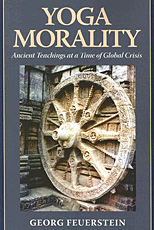"I believe that the spiritual and virtue-based morality of Yoga is as valid now as it was thousands of years ago. Although our lives have become far more complex, our human nature is basically the same as it was in antiquity. We are still subject to spiritual ignorance and its far-reaching consequences. We are still suffering from wrong views and negative emotions. We also are still yearning for happiness and inner freedom.
"The wisdom teachings of Yoga, which over the millennia have been taught by word of mouth, have demonstrated their relevance and efficacy over and over again. The various branches of the yogic tradition have produced hundreds of great masters even in recent history — masters who have excelled in wisdom, compassion, generosity, patience, and the other sublime virtues. Their teachings on mental discipline and ethics are abundantly and freely available to anyone wishing to benefit from them. What is more, these teachings include the kind of life-enhancing values that make sense within an environmental morality, which is the greatest desideratum today. . . .
"I have surveyed the moral teachings of Yoga within Hinduism, Buddhism, and Jainism and, I hope, have made a reasonable case for their contemporary applicability and usefulness. In order to drive home the point that a thorough moral overhaul is an urgent requirement, I have provided ample examples of the specter of moral failure that haunts our modern society, including the contemporary Yoga movement. This proved a rather sobering and often disquieting exercise for me, and I am sure my readers will experience a similar shock when confronting the full extent of our society's moral dysfunction. But we must first acknowledge the problem before we can set about tackling it. In this case, the magnitude of our society's moral failure is such that we cannot hope to bring about positive change at the systemic level without simultaneously transforming ourselves.
"The idea current in some circles that spirituality has nothing to do with morality is an unproductive and even dangerous will-o'-the-wisp. If spirituality is not embodied here and now, it is nothing at all. To become inwardly free, which is the promise of Yoga, we must begin with becoming virtuous — an old-fashion ideal, I know, but nonetheless true. There simply are no shortcuts to a freer, happier, and holier life. There also are no shortcuts to an environmentally whole coexistence with other life forms on this planet. Out of ignorance and selfishness, we are currently causing untold suffering to each other and to other species and are in fact responsible for what biologists are calling the Sixth Mass Extinction, equaling the extinction that occurred 65 million years ago as the result of a natural catastrophe.
"Climatologists are warning us that the point of no-return has been reached. In other words, they feel it is already too late to prevent catastrophe. We are already suffering the consequences of our laissez-faire attitude to global warming, and there is much more to come in the near future. We do, however, have a moral obligation toward our children and their children, who will inherit a vastly troubled planet. That means we absolutely must make appropriate choices NOW. We can no longer afford to be fence sitters. Particularly those who profess to tread the spiritual path must now vigorously combine their efforts of self-transformation with environmentally sound conduct. In our time, the only viable approach is a holistic and hence ecologically responsive Yoga, which acknowledges that we are teetering at the edge of planetwide collapse. I believe the principles of such a Yoga are plentifully present in the traditional morality of Hindu, Buddhist, and Jaina teachings.
"I cannot understand the cavalier attitude of many Yoga practitioners, especially those professing to be Yoga teachers, toward environmental concerns. It is nice but no longer enough to merely divvy up one's garbage into paper, plastic, and cans, and ignore all the other, even more serious environmental problems. If we purport to live a spiritually sound life, we have now no choice but to implement our spiritual principles and ideals as fully as we possibly can. It has become popular, for instance, for the wealthier among Yoga practitioners to go on retreats in foreign lands or take cruises with the Yoga stars. From an ecological perspective, both these practices are incredibly wasteful. Think of the hidden cost of jet fuel alone! Would it not make more sense — ecologically and spiritually — to find alternatives closer to home and donate the saved money to a charitable cause?
"Perhaps you, the reader, are already taking all the necessary steps to countermand the rampant consumerism of our own Western society by voluntarily adopting a simpler, saner lifestyle and by facilitating the efforts of environmentalists and animal rights as well as human rights activists. But if you are not, or are not yet fully committed to a transformative life, I hope that this book will impress on you the urgency of the situation. Our happiness in this world depends on the happiness of all.
"To the truly ethical man, all life is sacred . . ."
